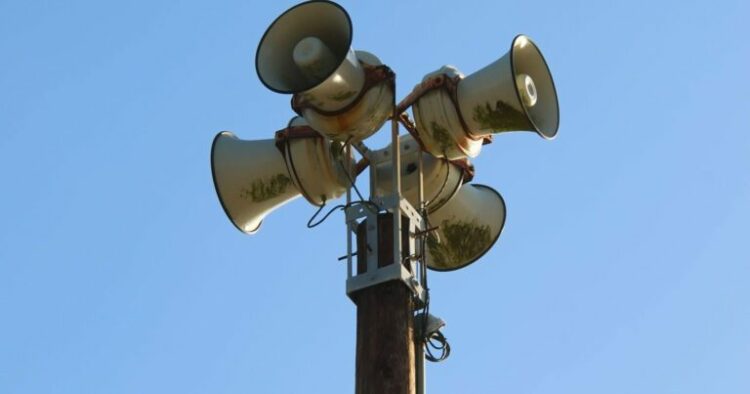
Feb. 16. By TL Bernthal. After a silent test alarm went audible for the McGuire Nuclear Station a month go, people asked Cornelius Today what they should do if they hear them again.
The short answer: Go inside and tune in your local radio or TV station and follow any instructions given; check with your neighbors to make sure they know what’s going on. An actual emergency will be accompanied by two, three-minute-long siren blasts.
The Charlotte Fire Department through the Charlotte-Mecklenburg Emergency Management Office – not Duke Energy or McGuire itself – does weekly silent alarm testing for the nuclear station in Huntersville.
A silent siren test Jan. 19 for McGuire Nuclear Station was inadvertently audible and raised fears of a serious problem at the plant, which was operating safely.
While Duke Energy owns and maintains the sirens around McGuire, the counties within the 10-mile zone around the plant are responsible for sounding the sirens and determining/communicating any public protection actions needed, to residents in that area, according to a Duke Energy spokeswoman.
Audible alarm testing is done quarterly and publicized by Duke Energy to avoid concern among residents who could be affected in a real emergency. The next tests are in April, July and October.
If you hear sirens

Photo: Duke Energy Explorium
If sirens are sounding and you do not see or hear a message on radio or television, contact your county’s emergency management office. Authorities recommend residents sign up for CharMeck alerts to receive information quickly.
To alert people indoors, radio and television stations will carry emergency information messages from local officials. Follow their instructions. Stay tuned. Outdoor sirens will not necessarily be heard inside homes or businesses.
In an emergency, fire, police and rescue units may patrol the affected area and sound their sirens, if necessary. Boaters also would be alerted via sirens, loudspeakers, etc.
If you hear a siren or emergency message, Duke Energy also encourages people living in the 10-mile emergency planning zones to check with their neighbors to ensure they are aware of the situations – especially neighbors who may have special needs.
The purpose of the sirens is to alert people who are outdoors to go inside and tune to a local radio or television station for additional information.
Hearing a siren does not mean people should evacuate, a challenge on local roads, not to mention I-77.
Siren test information
• Full-volume siren tests are performed on the second Wednesday of each quarter. Tests around Catawba and McGuire nuclear stations are conducted between 11 am and 1 pm. The next one will be April 12.
• Sirens are tested for five to 30 seconds in January, April and July.
• Sirens for all nuclear plants are tested for a three-minute period each October. This year that will be done on Oct. 11.
• Siren tests are loud and can be heard for several miles, although residents may or may not hear sirens while inside. In an emergency, the sirens would sound repeatedly.
• Sirens may also be sounded on non-scheduled days after needed maintenance. Local media outlets are notified if sirens are to be tested on a non-scheduled day, Duke says on its website.
Potassium iodide
Potassium iodide is a non-prescription medication that is used to protect the thyroid gland in the event of a nuclear release or radiological emergency. If taken at the appropriate time and at the proper dosage, potassium iodide can block the intake of radioactive iodine, therefore reducing the risk of thyroid cancer.
Pills are available at local police departments.
Nuclear safety
According to Duke, nuclear plants are built to withstand a variety of external forces, including hurricanes, tornadoes, fires, floods and earthquakes. Nuclear plants are constructed to withstand earthquakes of the magnitude equivalent to or greater than the largest known earthquake for the region where they are located.
Containment buildings that house nuclear reactors are robust – many times stronger than office buildings and skyscrapers. Nuclear plants also have numerous and diverse safety systems and physical barriers to protect the public, plant workers and the environment in the event of an emergency. Additionally, the US nuclear industry is heavily regulated by strict operational guidelines from the Nuclear Regulatory Commission.
Annually, Duke Energy mails emergency preparedness information to households in the 10-mile emergency planning zone of its nuclear plants, which includes siren test dates.




